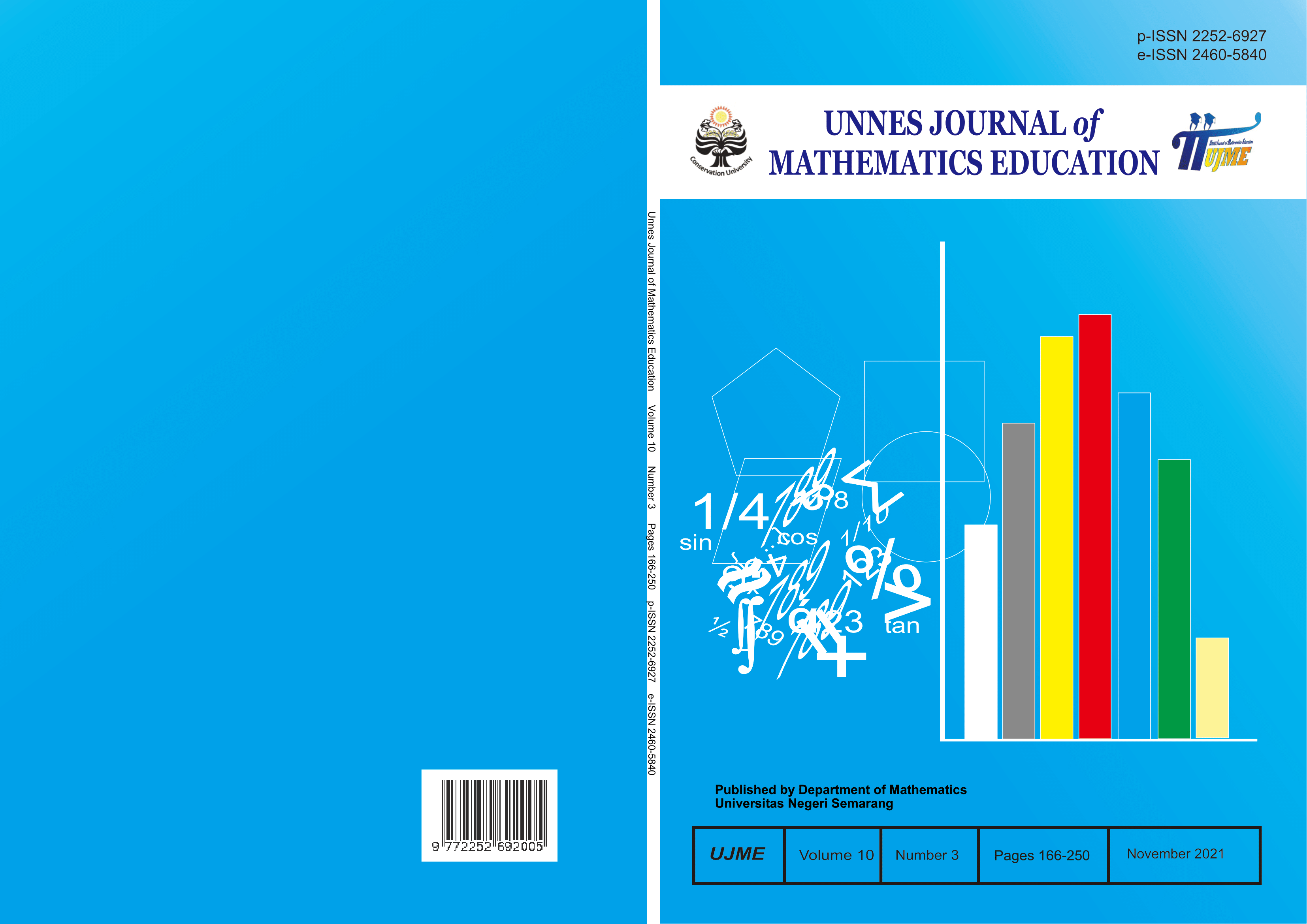Analysis of the Mathematical Representation Ability of Class VIII Students in terms of Self Regulated Learning with the Inductive Discovery Learning Model
##plugins.themes.academic_pro.article.main##
Abstract
The aim of this study was to determine the mathematical representation ability of class VIII students in terms of self regulated learning with the Inductive Discovery Leraning Model. This type of research is a mix methods research with a concurrent embedded desaign (unbalanced mix). The population in this study were class VIII students of SMP Negeri 40 Semarang in the academic year 2020/2021. The data collection technique used triangulation, comparing the data obtained from interviews, obsservations, and final tests of mathematical representation abilities. The research subjects selected were 6 students, consisting of 2 students with high self regulated learning, 2 students with medium self regulated learning, and 2 students with low self regulated learning. The results of the study indicate that students with high self regulated learning have high mathematical representation abilities, students with medium self regulated learning have medium mathematical representation abilities, and students with low self regulated learning have low mathematical representation abilities.
##plugins.themes.academic_pro.article.details##
References
Diba et al. 2018. Pengaruh Model Discovery Learning Terhadap Kemampuan Representasi Matematis Siswa. Jurnal Pendidikan Matematika Unila. ISSN: 2338-1183. Vol. 6, No. 3, Hal. 236-247.
Fitri et al. 2017. Meningkatkan Kemampuan Representasi Matematis melalui Penerapan Model Problem Based Learning. Jurnal Didaktik Matematika.Vol. 4, No. 1, Hal. 59-67.
Hapsari et al. 2019. Pengaruh Model Discovery Learniang Terhadap Kemampuan Representasi Matematis Peserta Didik. Prosiding Seminar Nasional Matematika dan Pendidikan Matematika. Vol. 2, No. 1b, Hal. 427-437.
Hayati et al. 2017. Pengaruh Penerapan Model Discovery Learning Terhadap Kemandirian Belajar Siswa. JP2EA. Vol. 3, No. 1, Hal. 75-80.
Khoirunnisa et al. 2018. Hubungan Kemandirian Belajar dengan Kemampuan Representasi Matematis Sisswa di SMPN 18 Tangerang. Seminar Nasional Pendidikan Matematika. Vol. 01, Hal. 182-190.
Kusumaningsih et al. 2015. Pengaruh Pembelajaran Berbasis Masalah dan Discovery Learning Terhadap Kemampuan Representasi Matematis Siswa SMP. Jurnal Ilimiah Pendidikan Matematika. ISSN: 2502-7638. Vol. 1, No. 2, Hal. 202-209.
Muhamad, N. 2016. Pengaruh Metode Discovery Learning untuk Meningkatkan Representasi Matematis dan Percaya Diri Siswa. Jurnal Pendidikan Universitas Garut. Vol. 9, No. 1, Hal. 9-22.
Nadia et al. 2017. Analisis Kemampuan Representasi Matematis Ditinjau dari Self-Efficacy Peserta Didik melalui Inductive Discovery Learning. Unnes Journal of Mathematics Education Reasearch. Hal. 242-250.
NCTM. 2000. Principles and Standards for School Mathematics. Reston, VA: NCTM.
Prasetyo et al. 2015. Eksperimentasi Model Pembelajaran Discovery Learning (DL) dan Problem Based Learning (PBL) pada Materi Bangun Ruang Ditinjau dari Kemandirian Belajar Siswa Kelas VIII SMP Negeri Se-Kabupaten Banyumas Tahun 2014/2015. Jurnal Elektronik Pembelajaran Matematika. ISSN: 2339-1685. Vol. 3, No. 9, Hal. 997-1008.
Sigia, S. 2020. Pengaruh Model Pembelajaran Berbasis Masalah (PBM) dan Kemandirian Belajar Terhadap Kemampuan Representasi Matematik Siswa SMA. Jurnal Kependidikan, Pembelajaran, dan Pengembangan. Vol. 2, No. 2, Hal. 14-25.
Sugiyono. 2013. Metode Penelitian Kombinasi (Mixed Method). Bandung: Alfabeta.
Sugiyono. 2018. Metode Penelitian Pendidikan Pendekatan Kuantitatif, Kualitatif, dan R&D. Bandung: Alfabeta.
